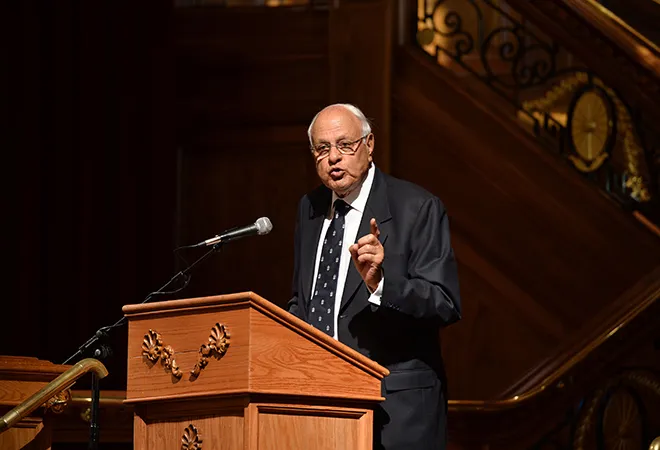The detention of Farooq Abdullah under the draconian Public Safety Act is a mockery of the law and the constitution.
The 81-year-old former chief minister of Jammu and Kashmir has been under arrest since the August 5 lockdown that preceded the reading down of Article 370. But the decision to formalise his detention under the PSA came in the wake of MDMK chief Vaiko’s habeas corpus plea to the Supreme Court.
It is not as if the Supreme Court has covered itself with glory by going along with the government’s specious approach on Jammu and Kashmir. On Monday, while hearing another matter, a bench comprising Chief Justice of India Ranjan Gogoi and Justices S.A. Bobde and S. Abdul Nazeer ordered, “The state of J&K, keeping in mind the national interest and internal security, shall make all endeavours to ensure normal life is restored.”
Instead of worrying about national interest and making theatrical gestures like promising personal tours of the state, the honourable judges should be doing what their job is — upholding justice, which has been under severe strain in J&K.
On the floor of parliament, on August 6, Union home minister Amit Shah had claimed that Farooq had neither been detained nor arrested, saying “He is at home on his own will.”
Now, suddenly, the government has discovered that the National Conference patriarch is a threat to public safety. Just what is this threat that requires his incarceration is not clear, unless it is the simple matter of not allowing him to express his opinion on the course of events the government has set in motion. As if this were not bad enough, it appears he has been confined to a single room in his house as part of his PSA detention.
Like all human beings and politicians, Farooq is not perfect. But he has, more often than not, been more sinned against than sinning.
The current dispensation is probably not well versed in history, so they may have forgotten the chain of events that led to the destabilisation of the Valley’s politics in the 1980s.
After the death of Sheikh Abdullah in 1982, Indira Gandhi, in her wisdom, decided that Farooq Abdullah and the National Conference should ally themselves to the Congress party in the state assembly elections of June, 1983.
Realising that this would severely dent his credibility in the Valley, Farooq Abdullah resisted and instead allied himself to Mirwaiz Farooq. Their alliance swept the polls, but then Abdullah made the fatal move of calling an all-India Opposition conclave in Srinagar in October, 1983.
Indira Gandhi retaliated by having Arun Nehru and Mufti Mohammed Sayeed organise a coup (with the help of Governor Jagmohan) that led to defections from Farooq’s party and his replacement by his brother-in-law G.M. Shah as chief minister in July 1984.
Three years later, going against his better judgment, Farooq agreed to an alliance with the Congress in the 1987 elections. The elections were rigged to the point of irrelevance. In these circumstances, governance of the state took a major hit. Both the Union and state governments seemed unable to stem the decline, marked by the virtual boycott of the 1989 Lok Sabha elections in the Valley. It was in these circumstances that Pakistan fanned the youth revolt that led to the rise of the insurgency in 1989-1990.
Even so, when the Jammu Kashmir Liberation Front launched its armed struggle, Farooq kept his wits about him. This came through when Rubaiyya, the daughter of the new home minister, Mufti Mohammed Sayeed, was kidnapped by JKLF elements demanding the release of their leaders in jail.
Farooq strenuously argued against any dealings with the JKLF. He used his contacts to pressure the JKLF to release Rubaiyya and had nearly succeeded when he was ordered by a committee of new Union ministers – Arun Nehru, I.K. Gujral and Arif Mohammed Khan – to release the JKLF leaders.
It was this single action that lit the fires that have ravaged the state since.
Between January 1990 and May 1996, Farooq stayed away from the state’s politics. In any case, this was a period when gunmen dictated the dialogue.
The Union government, increasingly desperate to show that normalcy had returned, continued to woo Farooq, aware that no election minus the NC would be deemed credible. It was only after a United Front government under H.D. Deve Gowda took office in New Delhi and promised “maximum autonomy” after the elections that Farooq relented.
He contested the elections, which was swept by the NC in September 1996.
Perhaps the most questionable aspect of the Modi government’s Kashmir policy is its decision to place all mainstream Kashmiri parties and their political leaders outside the pale of the country’s laws or for that matter, political processes. Only that can explain the pattern of detentions which range from a CPI(M) leader to the leaders and cadres of the NC, Congress and the People’s Democratic Party.
With the parties that upheld the country’s flag outside the pale, who does the government expect will take up the task of providing political leadership to the people in the Valley?
That is, unless the Union government is planning to treat the Valley as some kind of an internal colony of the country.
Representation in a legislature, both state and Union, is a basic right of the citizens of the country and the key building block of our democracy. Talk of Panchayati Raj just doesn’t cut it. Even with its forcible demotion, there is or will be a J&K assembly and most of those elected to it will be from the three major political parties.
So what can the government be thinking ?
This commentary originally appeared in The Wire.
The views expressed above belong to the author(s). ORF research and analyses now available on Telegram! Click here to access our curated content — blogs, longforms and interviews.




 PREV
PREV


